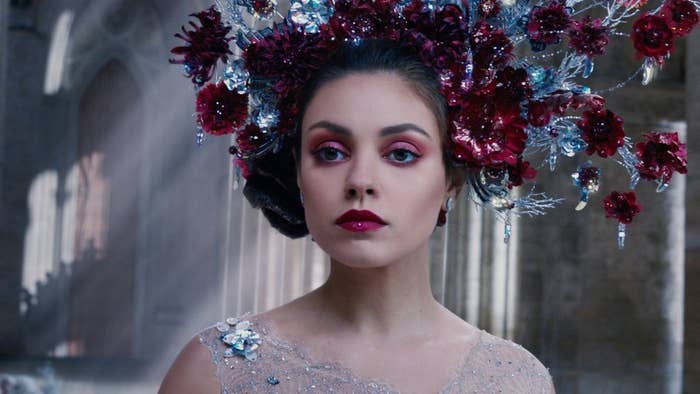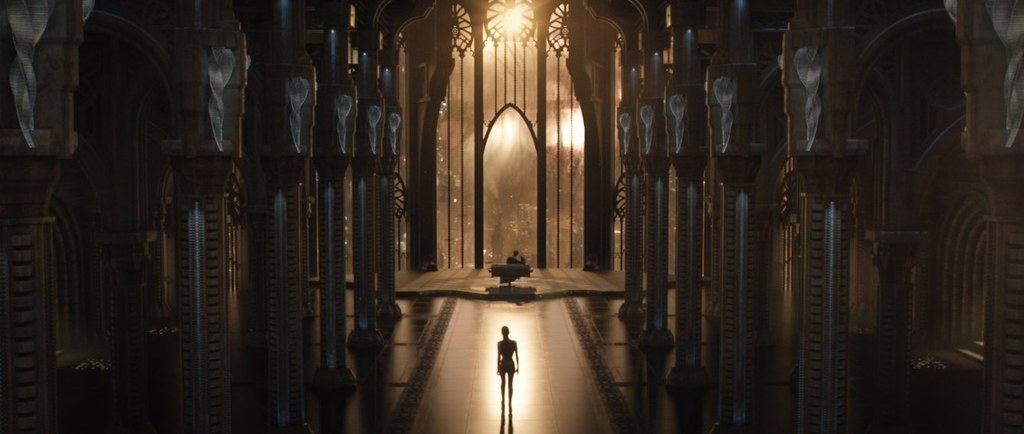
Jupiter Ascending is not a very good sci-fi movie.
It's just not. It has a heroine and hero, Jupiter Jones and Caine Wise, who are archetypes instead of characters — the royal in need of rescue and the impossibly capable warrior who is always poised to help her out with that. And the actors playing them, Mila Kunis and Channing Tatum, rarely get comfortable working in a stylized mode that requires them to talk about skyjackers and differential equation boots and fall in love in the beats between outsize action sequences.
Kunis and Tatum can't get on the same wavelength as fellow cast members like the mouse-ear-sporting Gugu Mbatha-Raw, the crusty Sean Bean, or Eddie Freakin' Redmayne, none of whom seem to share their trouble surrendering to Andy and Lana Wachowski's "go big or go home" vision. Jupiter Ascending does some gorgeous, expansive world-building, but the only way it can navigate the baroque cosmic empire it introduces is via a cycle of capture, rescue, repeat involving its two uncertain leads.
It's not a good sci-fi movie. But it is a good, sometimes even great, reworked fairy tale, a Cinderella story in which the servant girl gets swept away to the palace, only to realize that life as a princess is awful and not worth the trouble. The Wachowskis have marshaled a sprawling, intensely detailed old-school space opera universe, all to tell an ultimately simple story about appreciating what you have, with an antimaterialist bent that feels particularly perverse and daring coming from a $175 million studio effort.
The sibling directors have crafted a story that's a rebuttal to the classic trope in which someone finds out they've always secretly been the most important person in some magical other world they never knew about. Courtesy of her genetic code, Jupiter goes from unhappy housecleaner to intergalactic heiress, and being bequeathed with multiple planets turns out to be much worse than scrubbing toilets.


Jupiter starts the movie in a place of intense but aimless dissatisfaction, waking each morning at 4:45 a.m. in the room she shares with her mother and aunt in a crowded house to groan, "I hate my life." She's the child of a Russian immigrant and is technically undocumented herself, and her existence, while stable, isn't easy, but her unhappiness is focused on the things she lacks: the designer dresses and beautiful jewelry she poses with in front of mirrors in the houses she and her family clean. She doesn't exactly dream of rescue — when one of her clients describes an expected proposal from a billionaire as, yes, "totally Cinderella," Jupiter counsels caution and patience. But she can't stand her own normalcy, though she's pursuing no apparent plan to change things, only asking to borrow money from her uncle so that she can, as her uncle puts it, "waste it trying to make yourself feel better" by buying things.
Jupiter's working-class misery is contrasted with the gilded horror of the Abrasax empire, which takes toxic entrepreneurial tendencies and aristocratic exceptionalism to their highest level. You can't become a royal — membership into that tier is literally coded into your DNA, your genetics allowing you to sidestep not just the rules to which the rest of the universe is held, but also aging itself, with Abrasax siblings Balem (Redmayne), Kalique (Tuppence Middleton), and Titus (Douglas Booth) having easy access to rejuvenating serum that comes at a terrible price. In the Wachowskis' version of the extreme 1 percent, the royals don't only get to accumulate wealth over lifespans of thousands of years, they're able to leave their holdings to themselves in case of possible "recurrence." The Abrasax matriarch who shared Jupiter's genetic makeup accounted for her own potential reincarnation in her will.
Jupiter Ascending offers up all sorts of splendors, from the increasingly elaborate gowns its heroine keeps finding herself in to the striking estates the siblings have constructed for themselves — Kalique lives in an airy palace, while Balem resides on a refinery built inside Jupiter's gaseous core. And it also makes clear to us and to its protagonist just how much these luxuries are built on the destruction of other living beings. Earth and other unaware "underdeveloped worlds" are Jupiter Ascending's equivalent of developing countries, there to be exploited by more industrialized forces in a brutally vampiric economy. Jupiter may get to inherit incredible wealth, but with it she also has to accept, as Balem puts it, that "every human society is a pyramid, and that some lives will always matter more than others."

The idea of people as commodities, as fuel or food, has been a recurring nightmare in the Wachowskis' filmography, from the big reveal in The Matrix to multiple storylines in Cloud Atlas. But Jupiter Ascending links the ghastliness of this image directly to the essential industry of its universe, which is based on the more powerful and advanced preying on the unknowing — its market is powered by the decanted, distilled lives of oblivious humans. "Life is an act of consumption," Balem insists, even as having access to the resources of multiple galaxies seems to have warped him and his siblings into different degrees of monstrous.
And while Jupiter can be a frustrating, limp character, buffeted around by the plot rather than driving it, naïve and slow to catch on to the stakes of the new world into which she's been dropped, her lack of extraordinary qualities outside of her genetic sequencing does ultimately become part of the movie's point. There's nothing that sets her apart, aside from the luck of her birth, and she doesn't manage to cause a revolution or right the wrongs of the universe or do anything else heroic, in her past or present incarnation. The bravest act she manages, her big moment of agency, is choosing to trade her own life and those of her loved ones for the larger survival of Earth, which may not be a sweeping gesture but is a desperately resonant one. Jupiter chooses not to participate in a system in which her specialness depends on the ruin of others. Dramatic rescues and flying boots and space police and dragon aliens aside, her pivotal choice is to not be the princess.
And really, who wants to be the princess? No freedom, no blending in, and your wastrel relatives may attempt to involve you in their wretched space incest plots. Though Jupiter Ascending can feel maddeningly circular in its repeated rescue sequences and maddeningly unconvincing in its romance, there's a gratifying satisfaction to its moral arc, in which its heroine refuses to climb over the devastated civilizations that have been ground up by the empire into which she's born, no matter how nice the view on top. She chooses scrubbing toilets and happiness as a state of mind instead, and the fact that she now technically owns the planet, even if her day-to-day reality stays the same, is a nice touch. And it doesn't hurt that she keeps a bit of magic in her life — the scene of her spinning through the air on Caine's boots at the end has more giddiness than all the dazzling chases that came before it.
